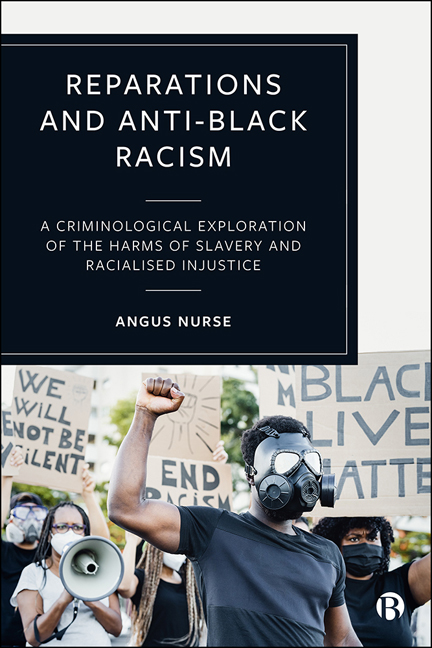 Reparations and Anti-Black Racism
Reparations and Anti-Black Racism Book contents
- Frontmatter
- Contents
- List of Abbreviations
- Acknowledgements
- Preface
- 1 Black Lives Matter: The Legacy of Slavery
- 2 Slavery and Reparations: A Criminological View
- 3 Reparations Litigation: An Overview
- 4 Victims of Slavery and Reparations: Who Suffers?
- 5 A Comparative Analysis of Reparations
- 6 Unjust Enrichment and the Socio-Legal Case for Reparations
- 7 The ‘Value’ of Reparations
- 8 The Nature of Reparations
- 9 Reparations in the 21st Century: Contemporary Debates and Issues on Reparations
- Appendix: Reparations Litigation and Settlements
- Notes
- References
- Index
4 - Victims of Slavery and Reparations: Who Suffers?
Published online by Cambridge University Press: 13 May 2022
- Frontmatter
- Contents
- List of Abbreviations
- Acknowledgements
- Preface
- 1 Black Lives Matter: The Legacy of Slavery
- 2 Slavery and Reparations: A Criminological View
- 3 Reparations Litigation: An Overview
- 4 Victims of Slavery and Reparations: Who Suffers?
- 5 A Comparative Analysis of Reparations
- 6 Unjust Enrichment and the Socio-Legal Case for Reparations
- 7 The ‘Value’ of Reparations
- 8 The Nature of Reparations
- 9 Reparations in the 21st Century: Contemporary Debates and Issues on Reparations
- Appendix: Reparations Litigation and Settlements
- Notes
- References
- Index
Summary
This chapter examines the issue of harm and suffering, one of the issues identified in reparations litigation and policy debates, in more detail. As Chapter 3 identified through its litigation analysis, some reparations claims have been dismissed in part due to the conception that there is nobody alive today who has directly suffered from slavery and thus in one sense there is no surviving victim who should be compensated. This argument distinguishes the ‘legacy’ of transatlantic slavery as an institution that was directed against Black people who are arguably still feeling its effects, from more recent harms like the persecution of the Jews in the Holocaust of World War II (Rosensaft and Rosensaft, 2002). Holocaust reparations have been paid in part because not only is the Holocaust a more recent memory, but also because several survivors and their children are still alive (Brandler, 2000). As a result, a direct victim who has suffered a tangible injury exists and the harm caused to them can arguably be addressed through reparative approaches that, for example, meet the costs of medical bills and the social care needs and pensions of ageing survivors (discussed further in Chapter 5). The Holocaust was also litigated in an international justice forum in accordance with contemporary international law perspectives (Bassiouni, 1979; Buergenthal, 2003; Bazyler, 2017) whereas transatlantic slavery has not been subject to the same process (discussed further in both Chapter 5 and Chapter 8). Thus, a more coherent legal basis for reparations arguably exists within Holocaust reparations where an identified perpetrator exists whose guilt has been established through normative justice processes.
This chapter considers the notion of harm and suffering from anti-Black racism through a criminological lens, drawing on arguments from race and crime, human rights and victimology discourse that contends that harm and suffering exist in both direct (individual) and indirect (wider community, family and descendants) contexts. In examining this issue this chapter builds towards the criminological theory of reparations as a remedy for wide-ranging harm that is set out in Chapter 9.
The nature of harm
While it is beyond both the scope and purpose of this book to detail the full nature of slavery and its harms, some consideration is given to articulating the extent of the harms caused by slavery and its impacts beyond the initial act of enslavement and the experience of living within a state of slavery.
- Type
- Chapter
- Information
- Reparations and Anti-Black RacismA Criminological Exploration of the Harms of Slavery and Racialised Injustice, pp. 48 - 60Publisher: Bristol University PressPrint publication year: 2021


